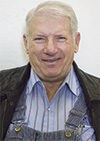It was 300 miles, roughly, from where I started first grade to where I finished first grade. Dad had bought a farm near Parma, Idaho. The last trip in the 1951 Ford F-6 truck brought the milking portion of the livestock, and we were officially moved. After a few days of getting settled in, I heard the conversation about it being high time to get Bradlee in school. My comments of being “just fine, thank you,” didn’t change anything.
I found myself being introduced to Mrs. Puckett’s class of first-, second- and third-grade students in the Ten Davis School. It was a two-story building with first through third grades and the lunch room on the first floor, fourth, fifth and sixth grades in one classroom upstairs, with seventh and eighth grades in the other upstairs classroom, taught by the school principal who always seemed to be scowling. A year or two later, they started bussing the older two grades to Parma along with the high school students from the Ten Davis District.
Dad’s uncle Charley Christensen and his sons Ronald and Merlin farmed together in the Dixie area south of Notus, Idaho, a town between Caldwell and Parma, but those kids all went to a different school. They were also builders and helped Dad pour the concrete floor for the milking part of the old big barn that was on the place. They traded farm work. Dad’s SC Case tractor was heavier than their little Ford or Ferguson tractors, so Dad did a lot of discing and plowing while his cousins baled our hay the first summer.
The baler Dad came up with for the next summer was a wire-tie Case baler with a V-4 Wisconsin air-cooled engine. It was a hand-tie baler. Dad sat on one side and threaded in precut lengths of baling wire with a preformed loop in one end while Mom sat on the other side joining the two ends of the wires and wrapping them enough to hold the finished bale together.
There was a huge old maple tree on the edge of one field. I was the tractor driver. Dad gave me quick instructions to change the speed by how hard the Wisconsin engine was pulling: Speed up if it’s loafing, and if it starts pulling hard, slow down and stop before I killed the engine because it was hard to get it started hot if one ever killed it. As we’d pass through a moment of shade, Dad would call out to me to stay and bale hay in the shade. I’d yell back to grow more hay in the shade!
A two-cylinder Wisconsin engine powered Dad’s combine, which he pulled with the Case tractor. My job was to chase the combine with the truck when the grain bin filled on the combine. After the grain was harvested, Dad had a big earthmover come and dig a silage pit for the corn silage. The cows were out pasturing on the grain stubble field and I was seated on Patsy, our saddle horse. My job was to keep the cows in the stubble field and out of the hay and off the road.
An occasional glance at the cows seemed adequate, as I was enthralled with the earthmover. Patsy eased closer and closer to the fenceline, but then the tip of her nose touched the electric fence. She did a spiral which corkscrewed me up into the air, and when I looked down, there was no horse beneath me and the dirt was coming up fast. Dad noticed this, and that also the cows were going AWOL. Dad wasn’t in good humor the rest of the day.
The night of the school Christmas program, as I was helping Dad milking, I had a fresh heifer panic and send the milking machine flying as I dived for cover beneath the big old cow beside her in the stanchion barn. Dad came and pushed the heifer over, then reached under the older, still-calm cow and pulled me out and up by my coat collar. I remember him looking me in the face and asking if I was OK. He said I better go on up to the house and have my mother check me out.
Mom was looking at a hoof track down the side of my back and I was thinking about the Christmas program. I said, “I think it’s close to the middle,” thinking about the program. Mom, looking at my back, said she could see that. We did make it on time.
With the axle from a discarded baby buggy, I added an axle so my red wagon could be like the milk truck that came every day. One day, some neighbors stopped to talk while we were doing something with the tractor near the road. I crank-started it because the neighbor’s kids said I couldn’t. Dad was smiling when I told him why and he tried to yell at me. After my grandfather’s funeral in Ogden, Utah, I heard Dad telling some relatives, “If that 8-year-old boy hadn’t been able to finish discing that 20-acre field after dark last night, we wouldn’t have been able to make it!”
Dad’s back caused him to trade the farm in for a motel in 1956. Considering what made me who and what I am, the Parma years laid the foundation. That cows have to be fed and milked, no matter what. That if I wanted chicken for dinner, I better get after catching one and chopping its head off. That you’re not done irrigating the pasture at quitting time; you’re done when the last blade of grass gets a drink.
Life’s a teacher and God is good!












